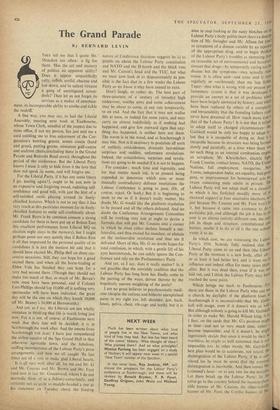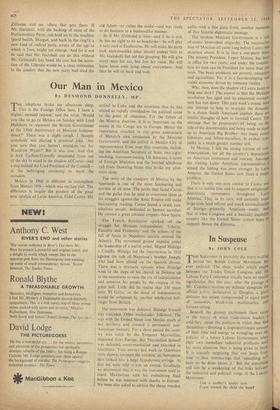The Grand Parade
By BERNARD LEV1N THEY tell me that I quote Mr.' Mencken too often: a fig for them. 'Has the art and mystery of politics no apparent utility? Does it appear unqualifiedly ratty, raffish, sordid, obscene and low down, and its salient virtuosi a gang of unmitigated scoun- drels? Then let us not forget its services as a maker of entertain- ment, its incomparable ability to soothe and tickle the midriff.'
A fine way, you may say, to hail the Liberal Assembly, meeting next week at Eastbourne, whose Town Clerk, mindful of the respect due to mine office, if not my person, has just sent me a card entitling me to free enjoyment of the Cor- poration's bowling greens, tennis courts (hard and grass), putting greens, miniature golf-course and seafront chairs (excluding those in the Grand Parade and Redoubt Band areas), throughout the period of the conference. But the Liberal Party. knows I tease it only to hide from it the love that dare not speak its name, and will forgive me.
For the Liberal Party, if it has any sense (there I go. teasing again!), ought to be just now in an expansive and forgiving. mood, radiating self- confidence and good will, with just the hint of a self-satisfied smile playing around its finely- chiselled features. Which is not to say that it has very much at this particular moment for its finely- chiselled features to smile self-confidently about. Mr. Frank Byers is by common consent a strong candidate for them to have put up at Bolton East (his excellent performance from Liberal HQ on election night stays in the memory), but I might perhaps point out very quietly that if Bolton East is all that impressed by the personal quality of its candidates it is just the teeniest bit odd that it should have elected Mr. Philip Bell on three suc- cessive occasions. Still, they can hope for a good second there, and when all the horse-trading at Ebbw Vale has finished they can hope for a very bad second there. (Though they should not make too much of that, as much of Mr. Bevan's vote must have been personal, and if Colonel Lort-Phillips should lop 10,000 off it nothing very spectacular will have been indicated; the great day will be the one on which they knock 10,000 off Mr. Beaney's 34,000 at Hemsworth.) And yet, as I say, the Liberals are not wholly mistaken in thinking that life is worth living just now. For it is not, of course, at Eastbourne next week that their fate will be decided; it is at Scarborough the week after. And the omens from Scarborough (oh dear; I have just remembered the airless squalor of the Spa Grand Hall in that otherwise agreeable town, and the fabulous, sniffing incompetence of the Labour Party's press arrangements. and how we all caught 'flu last time) are of a sort to make glad Liberal hearts.
It is afl very well. after all, for me and Mr. G and Mr. Cousins and Mr. Brown and Mr. Foot (and now at last Mr. Greenwood. whom I do not normally think of as a, Johnny-come-lately, and certainly not as quite so muddle-headed 'a one as his statement on Tuesday about the binding nature of Conference decisions suggests he is) to prattle on about the Labour Party constitution and NATO and the H-bomb and the block vote and Mr. Carron's head and the TUC, but what we must now look at as dispassionately as pos- sible is the fact that in a few weeks the Labour Party as we know it may have ceased to exist.
Don't laugh; or rather do. The best part of three-quarters of a century of (mostly) high endeavour, worthy aims and some achievement may be about to come, at any rate temporarily, to an end. And the fact that it may not realise this at once, or indeed for some years, and may carry on almost indefinitely as if nothing had happened, and give few outward signs that any- thing has happened, is neither here nor there. The worm is in the wood, and at Scarborough it may bite. Nor is it necessary to postulate all sorts of unlikely coincidences, dramatic last-minute surprises and sudden, unforeseen revelations. Indeed, the coincidences, surprises and revela- tions are going to be needed if it is not to happen.
• For consider: much time and ingenuity, and for that matter much ink, is at present being expended to determine which nine or more mutually contradictory defence resolutions the Labour Conference is .going to pass. (Or, of course, reject. Or both.) But it is beginning to seem to me as if it doesn't really matter. No doubt Mr. G would like the platform resolution to be passed and all the others defeated. And no doubt the Conference Arrangements Committee will be working very late at night to devise a formula that will put Mr. Cousins into a corner in which he must either declare himself a uni- lateralist, and thus exceed his mandate, or abstain on the unilateralist resolution and thus see it defeated. Short of this, Mr. G no doubt hopes for total confusion, in which, with a gentle lift of his eyes heavenwards, he can safely ignore the Con- ference and rely on the Parliamentary Party.
And yet, as I say, does it really matter? Is it not possible that the unwieldy coalition that the Labour Party has long been has finally come to the parting of the ways, driven thereto by the hopelessly uneven weighting of the parts?
I am no great believer in psychosomatic medi- cine (despite the curious and hitherto unexplained pains in my right eye, left shoulder, jaw, back, knees, pelvis, chest, rib-cage and teeth), but it is SPECTATOR. SEPTEMBER 2 3 , 196// time to stop looking at the nasty blotches on the. Labour Party's body politic (now there's a desalt': lion of Mr. Swingler and Mr. Allaun for }'01.1') as symptoms of a disease curable by an injecuoll of the appropriate drug. and to begin thinklii/ of the Labour Party's troubles as stemming from an incurable set of environmental and heroine) stresses that drugs—by temporarily curing not the disease but the symptoms—may actually make worse. It is often said—and none said it more regularly or vociferously than my late father. Taper—that what is wrong with our present per liamentary system is that it was developed t0 provide an answer to a set of problems which have been largely answered by history, and which have been replaced by others of a comnlesitY and intractability that the founding fathers could never have dreamed of. How much more true is that of the Labour Party! It is not that it refuses to adapt itself to changed circumstances—Mt' Gaitskell would be only too happy to adapt it' but that it is incapable of doing so. And it 15 incapable because its structure was being formed slowly and painfully, at a time when there olts no such thing as an internal combustion engine' an aeroplane, Mr. Khrushchev, electric HO; Frank Cousins, contact lenses, NATO, the Unite°. Nations, full employment, margarine, r`le%4 Towns, independent India, sex equality, ball-poiat pens, or imprisonment for homosexual acts he. tween consenting male adults in private. lite Labour Party will not adapt itself to a situation in which it has forfeited steadily more of 115 electoral support at four successive elections. ricd just because Mr. Cousins and Mr. Foot won't lei it, but because it came into existence to do e particular job, and although the job it has to de, now is an almost entirely different one, the onl) job its shape and structure, constitutional and, human, enable it to do at all is the one nobody wants it to do.
In which case, we are witnessing the Labour Party's 1916. Nobody fully, realised that the Liberal Party came to an end then (the Liberal Party at the moment is a new body, after all': or at least it had better be), and it went on influence and indeed office for many years there' after. But it was dead then, even if it was nor laid out, and I think the Labour Party may hav reached the same point.
Which brings me back to Eastbourne. For there are those in the Labour Party who can see worthless, he might as well announce that it ■05. in time--and not so very much time, either' impossible too. In other words, Mr. Gaitskell' best plan would be to accelerate, not retard. the disintegration is inevitable. And then comes Mr' Grimond's hour—or at any rate his ten minutes' in order to make Mr. Harold Wilson king, become impossible; and if it doesn't, he might ingeniously decide that since it would by then t' disintegration of the Labour Party, if he is con: vinced (as he must be soon) that the eventum rump go to the country behind the incompi chef.'" sible banner of Mr. Cousins, the other-■■orldbi 1 fear, on the cards that Mr. G's position might Let them break up the Labour Party: let the banner of Mr. Foot. the Cyrillic banner of Me' a church by daylight; if the platform loses at Scarborough it is inconceivable that Mr. Gaits' kell will resign, even if it doesn't win as well: But although nobody is going to kill Mr. Gaitske.I' it Zilliacus, and sec where that gets them. If Mr. Gaitskell, with the backing of most of the Parliamentary Party, can hold on to the machine (good health, Morgan, and back in the ring!), a new kind of radical party, aware of the age in which it lives, might yet emerge. And let it not be said that Mr. Gaitskell can do this without Mr. Grimond's tiny band. He can; but the accre- tion of the Liberals would be a clear intimation to the country that the new party had shed the old Adam—or rather the snake—and was ready to do business in a businesslike manner.
So if Mr. Grimond is wise—and if he is not, he has no right to be so handsome—he will play it very cool at Eastbourne. He will make his party look statesmanlike ,(that should endear him to Mr. Gaitskell) but not too grasping. He will give every man his car, but few his voice. He will leave loose ends lying about everywhere. And then he will sit back and wait.















































 Previous page
Previous page